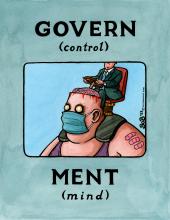2024-04-01
Free speech used to be taken for granted, thanks in large part to sensible legal precedents set by sensible judges in times past, who opined that the right to speak only without offending was not worth having. Now a quick internet search for "the right to speak only without offending was not worth having" pulls up a myriad of articles about how to speak without causing offence, but none about the status quo ante, so far has the needle been pushed away from previous precedent.
And yet, whilst offence may or may not be "offered", it doesn't instantiate unless "taken" - and these days it doesn't even have to be offered to be taken, it can be taken anyway. Therefore in principle, the party that "gives" offence isn't able to judge whether or not "offence" will be taken. One can guess, but one cannot be reasonably sure either way.
Laws based on such a subjective definition of the alleged "offence" (in its legal sense of falling outside legal/lawful behaviour) are not ideal. In practice it simply brings the law into disrepute.
Of course there are well-established legal limits to speech - one may not slander anybody (ie: defame verbally by telling fibs) - that may also offend but the offence of slander is already a civil matter that can be settled for damages in the Civil Courts. One may not incite criminal activity or civil unrest, and whilst in some cases there may be a narrow dividing line between civil protest and civil unrest, unrest and protest have never been equated in law.
So it comes to pass that numerous guidelines have to be written by numerous organisations simply in order for members of those organisations to stay out of trouble for speaking one's mind.
Personally, I would opt for the status quo ante: that free speech is far more important than the notion that somebody might take offence, and in a free society people should be robust enough to take any minor but legal offence on the chin and move on - after all, if slander is committed you can take them to court for damages, but if no criminal activity is incited you are never obliged to take offence, better to put it down to experience and get on with your life.
Remember the law works both ways - if you can take offence at the speech of others, others can also take offence against yours ...
"Many months of work alongside the Free Speech Union have gone into getting this policy right, and this is only the beginning – the many years of local authorities getting free speech wrong need to be put right"
And finally, guidelines cost money, unnecessarily complex guidelines cost excessive amounts of time and money to write and to administer, and we wonder why our standard of living is going down the drain whilst everybody is investigating what in times past never needed to be policed and investigated.



